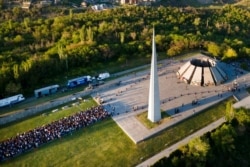Armenians in the Middle East, in modern-day Armenia and in other parts of the world on Saturday marked the 106th anniversary of the beginning of what historians call the Armenian genocide.
Hundreds gathered at the Armenian Patriarchate north of the Lebanese capital, Beirut, for the observance. The head of the Armenian Orthodox Church of Cilicia, Aram I, delivered a eulogy for the victims.
Paul Haidostian, president of Haigazian University in Beirut, told VOA he attended the three-hour memorial service, in which the patriarch expressed his thanks to U.S. President Joe Biden for recognizing the mass killings of Armenians as genocide.
Historians say an estimated 1.5 million Armenians died at the hands of the Ottoman Empire — the predecessor to modern-day Turkey — between 1915 and 1923.
The genocide, said Haidostian, officially began with the arrests of leading Armenian political figures and intellectuals in the Ottoman capital, Constantinople, in 1915.
"The reason they mention April 24 [is] symbolic, in a way, because in Constantinople a few hundred leaders and politicians — Armenian leaders and intellectuals — were arrested and deported and killed, and then it was followed by systematic attacks all over the country," he said.
Country's character changed
Haidostian added that "the end result was that Armenians were either killed or kicked out of their historic lands ... basically changing the character of eastern Turkey and Anatolia ... and leaving a very different country with a totally different people."
The large Armenian community in Aleppo, Syria, commemorated the mass killings, while a marching band paraded through the streets of the city and waved burning torches as dusk fell over the region. Armenians also marked the event in the Syrian capital, Damascus, and the mostly Armenian town of Kessab, near the Turkish border.
Demetrios Orologas, a Greek writer living in the Armenian capital, Yerevan, told VOA that Armenians paid tribute at the genocide memorial, laying wreaths and playing music to honor the victims.
Parts of Orologas' own Greek family were also expelled from the formerly Greek city of Smyrna, which Kemal Ataturk, a military leader who became the founder and first president of the Republic of Turkey, burned in 1923. Orologas' mother and her family were forced into exile in Greece after the calamity.
"Not only the event was terrible, but also the wars that came after … [my family] became refugees, they became outcasts, they lost their homes, they lost their fortunes and they lived for years under a regime that was not friendly to them," he said.
Biden officially recognized the Ottoman-era Armenian genocide in a statement Saturday, 106 years to the day after the first Armenians were killed.





